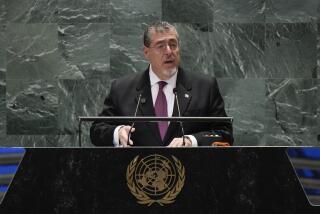Work to Do in Guatemala
Guatemalans went to the polls last month fearing the tricks and threats of the governing party, which was poised to return to power former Gen. Efrain Rios Montt, who presided over a brutal scorched-earth policy against Indian villages before and during his rule in 1982 and 1983.
Happily, the old despot didn’t get the votes. A runoff between the conservative former mayor of Guatemala City, Oscar Berger, and Alvaro Colom, an engineer who headed a center-left political coalition, was conducted peacefully Sunday, and Berger won.
Praise goes to Berger for his selection of Eduardo Stein as his vice president. A veteran diplomat for the Organization of American States, Stein is known throughout Latin America for his dedication in assisting countries in setting up clean electoral processes.
Unfortunately, Berger faces a short honeymoon in a nation immersed in a profound economic crisis.
Guatemala is the third-poorest country in the Western Hemisphere, with one of the widest gulfs between rich and poor. Outgoing President Alfonso Portillo presided over four years of dysfunctional, corrupt government. The country suffers from a growing violent-crime problem: Every day there are at least 10 armed robberies on public buses. The educational gap between Guatemala and other Central American nations such as Costa Rica is wide and growing.
The Portillo presidency’s high-level corruption scandals clouded the relationship between Guatemala and the United States. Graft was so widespread that during his Senate confirmation hearing in October 2002, U.S. Ambassador John Hamilton boldly stated that “corruption and organized crime are significant problems in Guatemala.”
Washington determined that Guatemala had failed to cooperate with the U.S against drug traffic in 2002, and last March Hamilton summed up U.S. concerns. Addressing the American Chamber of Commerce in Guatemala City, he excoriated the Portillo government for its failures concerning narcotics and in “combating clandestine groups that traffic in things other than drugs through their influence in the government and the ports.” He also pointedly mentioned the impunity of threats against human rights workers.
The burden on Berger as he takes office Jan. 14 will be large. The U.S. Congress can do its part by ratifying the Central American Free Trade Agreement negotiated this month by the Bush administration and four Central American governments, including Guatemala.
More to Read
Sign up for Essential California
The most important California stories and recommendations in your inbox every morning.
You may occasionally receive promotional content from the Los Angeles Times.










